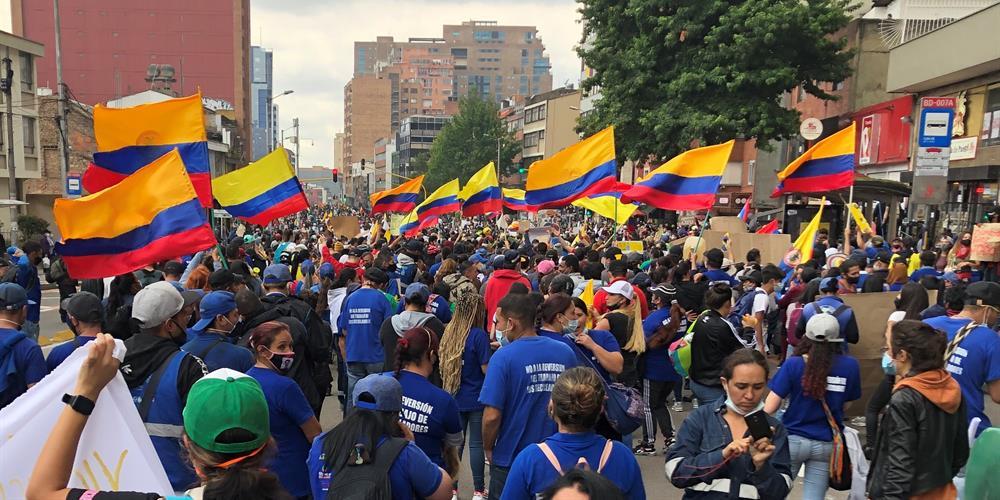

JustaPaz, the justice and peace ministry of the Iglesia Cristiana Menonita de Colombia (IMCOL), nestled between other citizens, human rights workers and labor unions joins the march on the Séptima, one of the busiest streets in Bogotá.
“There are some things that a church cannot do,” stated Carlos Moreno, national administrator of the Iglesia Cristiana Menonita de Colombia (IMCOL). “We cannot stand by silently in the face of injustice.”
In a recent Zoom conversation with Mennonite Church Canada International Witness, Moreno described a meeting between Colombian president Ivan Duque and church leaders in Colombia that took place in May, after months of civil protests. Attending on behalf of IMCOL was president Yalile Caballero. As other church leaders praised the president for his hard line against the protestors, Caballero declared that what they were saying was wrong. She decried the violence being used by government against the protestors.
While government sources quote numbers as low as 20, human rights organizations say more than 70 people have been killed and more than 300 people have “disappeared,” a term Isaias Rodriguez Arango, a member of the International Witness Support Network for Colombia, says is used when protestors do not go back home and are not found in either hospitals or detention centres.
Caballero and Moreno say there are two main groups of protestors: the organized strike committee, made up of major unions, social and community organizations; and the youth protestors.
“The youth see no reason to stop protesting. They have little hope. They feel they have nothing to lose,” Caballero said in the Zoom conversation.
While the youth see some positive change due to the protests, like the withdrawal of oppressive tax and health reforms proposed by the government, people still protest long-term abuses by police, violence by paramilitary groups and the need for structural reforms to address social and economic crises.
Caballero and Moreno shared that IMCOL congregations have been supporting protestors with food, water and sometimes shelter. One congregation has faced death threats from paramilitary groups for doing so. There is also a rise in urban paramilitarism, including cases where civilians have shot protestors while police stand alongside and do nothing.
Strikes and unrest are causing disruptions in supply chains and prices for fuel and food are rising. At the same time, COVID-19 cases are increasing, with more than 500 new cases reported every day. ICUs are near full capacity. Congregations try to support each other and their neighbours but need to be careful how they do this to avoid being the targets of violence, say Caballero and Moreno.
They also say that it is important for their family of faith, especially the youth, to know that they are not alone, that their global family understands what is happening to them and is praying for them.
We invite your prayers and support for IMCOL. Mennonite Church Canada will host an online conversation with IMCOL on July 10, at 11 a.m. CDT, to learn how church bodies are responding to current injustice in Canada and Colombia. Register here.
To support IMCOL with donations, go to mennonitechurch.ca/colombia.